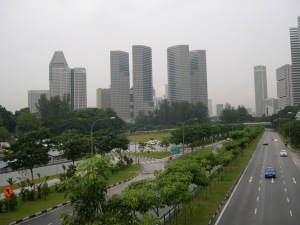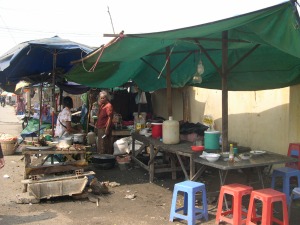I am currently attending the International Continuing Education Course on Sustainable Communities: Bridging the Gap between Research and Action. The course is conducted at the Asian Institute of Technology Conference Center in Pathumthani, Thailand. It started on 11 August and will run until 22 August. The organizers of this training are AIT (Urban Environmental Management Program), Helsinki University of Technology, UN-HABITAT and UNEP. Major funding is provided by the Government of Finland. The Opening Ceremony was held yesterday, 11 Aug, and was attended by Mr. Lars Backstrom (Ambassador of Finland to Thailand), Mr. Toshi Noda (Director, Regional Office for Asia and the Pacific, UN-HABITAT), Ms. Dechen Tsering (Deputy Regional Director, Regional Office for Asia and the Pacific, UNEP) and AIT dignitaries such as Prof. V. Wuwongse (VP for External Relations) and Prof. S. Kumar (Dean, School of Environment, Resources and Development). Dr. Edsel E. Sajor, the Local Organizer, emceed the Ceremony.
There are 28 participants from Asia and Africa, coming from diverse backgrounds and experiences, but with a common goal in mind, to know more about how to make communities sustainable. Some of the issues and points mentioned by the speakers during the Opening Ceremony are highlighted below:
Prof. V. Wuwongse spoke on behalf of AIT, welcomed all the participants, guests and organizers, and informed the audience of AIT’s commitment to sustainable development. He also acknowledged the financial support from the Government of Finland.
Prof. S. Kumar spoke on behalf of SERD, saying that the topic is timely and necessary. He mentioned that it is a great challenge to bring research results into action. He also shared what AIT is doing to contribute to the global economy and development, and confirmed AIT’s commitment to contribute to sustainable communities through education, research, training, outreach, etc.
Ambassador Lars Backstrom said that he was glad to know that the topic on sustainability is being followed or pursued, which has a huge interest for the future of the planet. He said that his government is happy to finance this course to be able to reach a wider range of people so that they will know more about sustainable communities. He emphasized the need for closer cooperation between academe/research and practitioners. He cited Bangkok as a complex city and it would be good for the trainees to know more about it through the exposure from this training. He commented that Bangkok can do with a public transport system, and it has moved forward with providing such system but it has least space for streets compared to other cities in the world. He further added that there is a huge amount of cars but there is no space to accommodate them. Major issues faced by cities include pollution in Chiangmai and vulnerability in Bangkok, i.e. it is only 1.5 m above sea level so it will be affected by global warning. However, there are some who say that there is no proof of it. In Phnom Penh, the poor are being driven out of the city and their land is being taken away from them. Finland is helping them to have claim on their land, with about 6 million titles to be given out.
Mr. Toshi Noda thanked the organizers and the support and assistance given. He also welcomed the participants. He went on to talk about UN Habitat activities, on housing issues and their aim to promote socially and environmentally sustainable cities. He mentioned that cities are growing at rapid rates with both good and bad issues to tackle, and that by year 2050, 6 billion people will be living in cities. Urban areas generate wealth and opportunities but at the same time also crimes and other social problems, thus sustainable urban development is one of the greatest challenges. This is directly related to the MDGs to improve lives of city dwellers (esp. targets 7, 10). We can’t reach this goal without collaboration and cooperation with local communities who need to participate and take action by themselves.
Ms. Dechen Tsering noticed that participants come from different backgrounds and we need this diversity to network beyond our own. She asked a question: what do sustainable communities mean to us? Asia’s cities will increase but it is also home to a large % of poor. There are issues of climate change, housing settlement problems, green house emissions, impacts of increase in global temperature and food security, among others. There are many challenges, with cities as the major source of emissions. There are many issues affecting sustainable communities, including refugee situation and other conflicts, vulnerabilities of climate change and dramatic transformations. She said that political leadership and will to change are important factors. She mentioned that UN is implementing sustainable clean and green initiatives. It is important to have partnerships with other UN agencies, civil society organizations and other groups to expand networks. She also noticed that there are good practices but they are not upscaled or replicated in a manner that other cities can follow; we need to know what are the gaps and barriers to avoid and how technologies can be shared.
The speeches given by the guests were very useful and good starting points to get us started thinking re: how this training can be useful towards processing some of the issues affecting our own communities, work and studies. I will be writing in this blog about this training and my experiences whenever I find time.
More links:
http://global.tkk.fi/Continuingeducation.html
- So many urban related issues facing most cities …







[…] bookmarks tagged training Training on Sustainable Communities (1) saved by 9 others hibiki2364 bookmarked on 08/12/08 | […]
LikeLike
Pingback by Pages tagged "training" — August 12, 2008 @ 7:01 pm
you know, ate, the name “Lars Backstrom” is actually of swedish origin. although their cultures are so alike, the swedish and finnish language are worlds apart. one can easily distinguish which origin the names come from.
LikeLike
Comment by lararinna — August 14, 2008 @ 2:34 pm
you know, ate, the name “Lars Backstrom” is actually of swedish origin. although their cultures are so alike, the swedish and finnish languages are worlds apart. one can easily distinguish which origin the names come from.
LikeLike
Comment by lararinna — August 14, 2008 @ 2:35 pm
[…] – Training on Sustainable Communities (1) saved by NarutoBakakun2008-09-09 – “Wikireuse” by Julia Christensen saved by […]
LikeLike
Pingback by Websites tagged "communities" on Postsaver — September 13, 2008 @ 6:17 pm